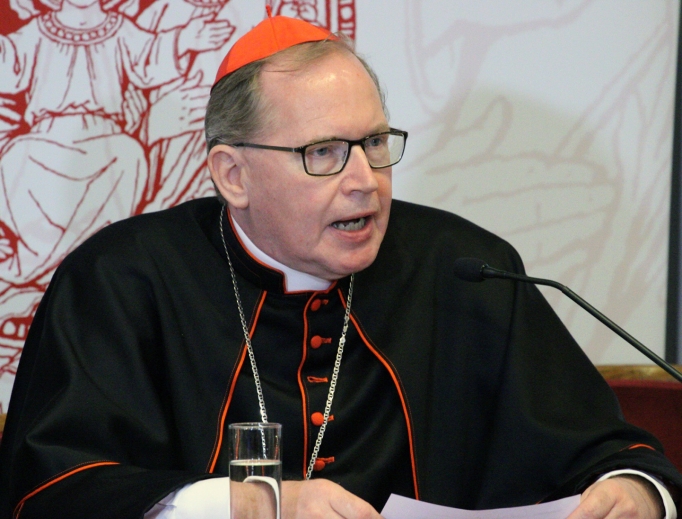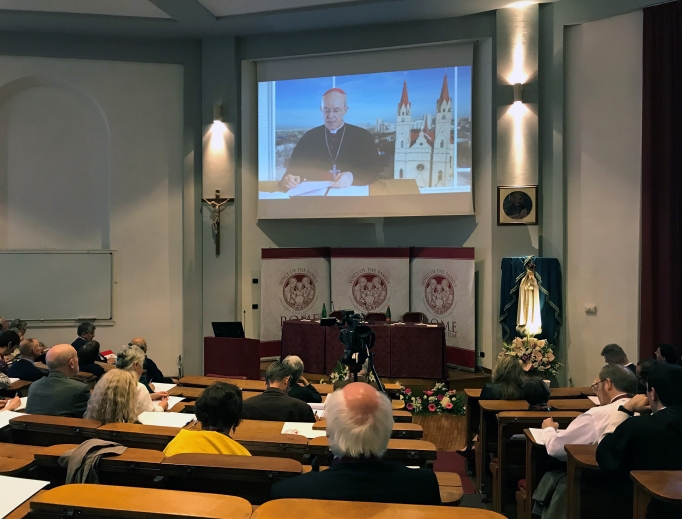What Is Human Society Like Without Christ?
Rome Life Forum gathers speakers to discuss the ramifications.

ROME — The dangers and devastating consequences of building nations and human societies without Christ as their foundation were discussed at a two-day Rome conference last week featuring talks from a number of prominent and respected Church figures.
The Rome Life Forum, an annual event of the international pro-life movement, was on the theme “City of God vs. City of Man — Global One World Order vs. Christendom.”
The May 16-17 meeting, held at the Pontifical University of St. Thomas Aquinas, culminated in Italy’s March for Life through the streets of Rome May 18.
In his talk, Cardinal Willem Eijk, the archbishop of Utrecht, Netherlands, focused on gender theory, warning that it sets humanity against the Christian faith.
He explained how radical feminism and the “hyperindividualism” that began in the 1960s have led to individuals being urged not to accept what were once accepted social and biological roles related to gender.
Media and advertising have exacerbated this trend, and now “gender equity” is promoted worldwide, leading to wider acceptance of gender-alteration surgery and other such harmful consequences. Cardinal Eijk noted this is “particularly dominant in the English-speaking world.”

The Dutch cardinal referred to Pope St. John Paul II’s teaching on the complementarity of the sexes as a remedy against radical feminism and gender theory.
Turning to how the theory “radically contradicts” the Church’s teaching, Cardinal Eijk said its separation of sexual relationships from procreation has led to the promotion of legalized abortion and the undermining of parental and spousal roles and relationships between children and parents. The detachment of gender from biological sex “damages” the analogy between Christ and his Bride, the Church, he said, and makes it “immaterial” whether a “priest is male or female.”
Showing the errors of gender theory “is of the utmost urgency,” he concluded, because “not only sexual morality but also proclamation of the Christian faith in itself are at stake.”
‘Virtue of Patriotism’
Cardinal Raymond Burke, the patron of the Sovereign Order of Malta, praised the “virtue of patriotism” at a time when various entities believe the “only way to achieve the common good” is through a single government.
His comments also come at a moment in history when nationalism is growing, in contrast to increasing calls, including from Pope Francis, for a supranational authority to deal with such issues as climate change and to enforce U.N. goals.
The virtue of patriotism, the cardinal said, reflects the Fourth Commandment to honor one’s father and mother and helps marriage to flourish; and, quoting St. Thomas Aquinas, he said patriotism is not a sin but a “requirement of nature itself.” He explained how it is a precept of the natural law and a “recognition of the good order” God has placed in civil society.
But he observed that “many governments” today fail to “recognize that their authority comes from God,” leading to laws that “grievously” violate the moral law. Referencing the Catechism, he showed how this can lead to a totalitarian state, given that most states today are “totally secular.”
“The divine authority, in accord with the order written upon the human heart, does not make just and legitimate a single global government,” Cardinal Burke asserted. “In fact, the divine law illumines our minds and hearts to see that such a government would be, by definition, totalitarian, assuming the divine authority over the governance of the world.”
He said “sinful pride” inspires such a pursuit of a single global government and equated it to the building of the Tower of Babel. “On the contrary, God meets us and orders our lives for the good in the family and in the homeland,” he said.
Answering questions from the audience, Cardinal Burke referred to an “excellent book” by professor Anthony Esolen, now a faculty member and writer in residence at Northeast Catholic College in Warner, New Hampshire, called Nostalgia: Going Home to a Homeless World, in which Esolen points out how young people today “raised without a sense of their national identity or identity with their homeland become completely disorientated with regard to the moral life and in general.” This is “humanly very devastating,” Cardinal Burke said.
Humanae Vitae’s Example
Cardinal Walter Brandmüller, president emeritus of the Pontifical Committee of Historical Sciences, highlighted the battle over acceptance of contraception and Pope St. Paul VI’s 1968 encyclical Humanae Vitae as an example of the city of man versus the city of God.
He recalled how the 1930 Anglican Lambeth Conference’s vote in favor of contraception broke a “barrier” that led to other Protestant churches following suit. “Surprisingly,” given its seeming animosity to Church teaching today, he said The Washington Post joined in the protests against the Lambeth Conference decision and foresaw its consequences.
In a 1931 editorial, the newspaper wrote that the effect of the vote, if “carried to its logical conclusion,” would “sound the death knell of marriage as a holy institution by establishing degrading practices which would encourage indiscriminate immorality.” It also added that the suggestion legalized contraceptives “would be ‘careful and restrained’ is preposterous.”
Today, Cardinal Brandmüller said, “we’re confronted with results of a process of erosion” that began in 1930 and “has led us to the monstrosity of what is today known as procreative medicine, by which man has seated himself on the throne of the Creator.”
By contrast, he said Humanae Vitae provides “an extraordinary example” of the transmission of Church doctrine, and “it is the Holy Spirit that ensures that the faith of the Church develops in the course of time,” as formulated by Vincent of Lérins and elaborated upon by Blessed John Henry Newman.
“Today, we hope for a renewed reception, adoption and more profound transmission of the truly prophetic teaching of Paul VI in our days,” he concluded.
Family as ‘Spiritual Treasure’
In his speech, Cardinal Jānis Pujats, archbishop emeritus of Riga, Latvia, underlined the importance of the family as a “repository of spiritual treasure” that must be guarded from being “destroyed and plundered by the great Robber whom we know as Satan.”
The “great Robber,” he added, is at work today, for example in the guise of abortion, legalizing same-sex “marriage” in one state after another, and acceptance of cohabitation.
But he said the ideal of a European Union “rooted in Christian values” should not be abandoned, because to “believe and follow God’s commandments” is a “normal way of life and behavior in this world” and “should be respected and guaranteed by the educational system of every state.”
In this context, and at a time when many are enslaved by vice, he stressed the importance of God’s first commandment: to love God “more than anything else in our life” and to “seek contact with God in prayer as often as possible.”
In a video message, Auxiliary Bishop Athanasius Schneider of Astana, Kazakhstan, stressed that a city or community without God is one of “hopelessness” and recalled that Satan was the first to attempt to create this. It leads to a “tyranny of the egoism, of narcissism,” and a society “of the law of the jungle, to a society of cruelty.”

The city of man, he said, is rooted in “totalitarianism” and will not tolerate the reign of Christ the King. The enemies of God, he pointed out, try to “take possession” of any means in their power, such as the media, science and arts, “to spread the disdain of things sacred” with the goal of “destroying man.”
He added that when God’s foundational order is attacked, “ominous fissures appear in the structure ... values become blurred and uncertain,” resulting in policies decided “according to the prevailing fashion, upon merely external factors, and often even upon blind instinct.”
On the other hand, he said, “true liberty, true humanity, true social progress” are only guaranteed “when the will of God the Creator in his commandments and the will of God in his revelation in Christ is accepted and observed, and when Christ’s kingship over human society is recognized.”
Quoting St. Augustine, he said the “union with God’s will is the center of the City of God, and it will be achieved in eternity.”
Other Remarks
In other speeches, Steven Mosher of the Population Research Institute reflected on the worsening situation facing the faithful in China.
The recent and still-secret Sino-Vatican agreement signed last September was supposed to provide some protection of the Church in China but “has instead been turned on its head,” he noted. “Harsh new restrictions” of all religious believers in China began before the agreement, notably since February of last year, but Beijing has used the accord as “an excuse to limit, not expand, religious freedom of Catholics.”
Efforts have intensified, he said, and the government seems intent on driving all religions out of public life. “Churches and shrines that have stood for centuries are being reduced to rubble,” he pointed out, adding the goal is to “brainwash everyone into believing only in communist leader Xi [Xinping] and his party, rejecting God and his Church.” Communism has “always been a total ideology,” he said, seeking control of thoughts as well as acts, and it is now carrying this out through digital media, among other means.
Anthony Murphy, the editor of the Catholic Voice, gave an assessment of the city of God in Ireland and noted that the “great catastrophe” in the country, which has recently voted to allow legalized abortion and same-sex “marriage,” “is reaching its crescendo” and “sweeping all before it.”
“We must once again put the Divine perspective, first in all our actions and public utterances, if we are to rout our enemies from the City of God that is Ireland,” he said. “Failure is not an option, and we will continue to fail until we return Christ and Our Lady to their rightful place as head of our Catholic organizations. We must also encourage our clergy to do likewise.”
Professor Roberto De Mattei, the president of the Lepanto Foundation, recalled how a process of “revolution” beginning with the Protestant Reformation triggered a series of later revolutions and counterrevolutions — a history of struggle between the City of God and the city of man.
The revolution process, he said, is “Satanic in essence” and a journey “toward nothingness” and “global chaos.” Satan, he said, “prefers to conquer men of the Church rather than the laity and, from among the men of the Church, those who have the highest vocation; to lose a pure and generous soul, to lose a saint, to lose a bishop, to lose a pope: These are Satan’s greatest conquests.”
But he concluded by exhorting the hope and trust the faithful must have in the Lord, which “animates our struggle in the battle on earth, which is pleasing to heaven.”
Other speakers included professor Alan Fimister, an assistant professor at St. John Vianney Seminary in Denver, whose speech, rich in historical references, reminded those present of the “eternal enmity between the world and the Church,” whose “fundamental motivations and intentions remain utterly opposed.”
Dominican Father Kevin O’Reilly, a professor of theology at the Pontifical University of St. Thomas Aquinas, noted that modern culture is marked by “a withdrawal from the cross of Christ,” leading to the “culture of death,” which is “fueled by a subversion of the natural inclinations.”
He focused in particular on the “homosexualization of the priesthood,” which, he argued, “has probably contributed to the advance of the culture of death in the Western world” and is arguably “at the heart of the malaise that has enveloped Western civilization.” The homosexualization of the priesthood, he added, has led to a failure to “communicate the Church’s moral teaching in all of its distinctiveness.”
Edward Pentin is the Register’s Rome correspondent.


















